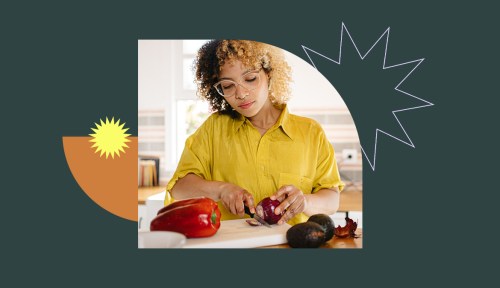How an Anti-Diet Dietitian Wants You To Break Free From the Restrict-Reward Diet Cycle
An anti-diet dietitian shares how to rethink the "new year, new you" mentality and create a more intuitive approach to healthy eating.

Call it a blank slate, a fresh start, a clean sweep—however you phrase it, there’s something about a new year that tends to drive people toward an all-or-nothing approach. Goals get the overhyped title of “resolutions,” and lots of folks commit not only to doing new things, but to becoming an entirely new them. When that extra zeal mixes with diet culture, though, it can create a dangerous concoction of unhealthy, unsustainable eating habits—like, say, detoxing all sweets only to inevitably crave them even more. But it is possible to escape that restrict-reward diet cycle, while also making progress toward positive eating goals, according to an anti-diet dietitian who shares her approach on the latest episode of The Well+Good Podcast.
Experts in This Article
anti-diet dietitian based in Philadelphia, Pennsylvania
Listen to the full episode here:
The main issue with going all-in on really any kind of diet is that it usually ends up being pretty restrictive, especially with the buzz of self-improvement in the air this time of year. “What happens during the holidays is [that] we get told up-front that we’re going to indulge too much,” says anti-diet dietitian Dalina Soto, RD, LDN, in the episode. “And marketing tactics create a scarcity mentality around holiday foods… We start to think, ‘This is the only time I’m going to get it, so I have to eat it all now,’” she says. Then, come January, we’re convinced we overdid it. “And now, we feel the need to make up for it by heavily restricting our eating,” says Soto.
On the one hand, that’s putting a ton of pressure on the new year. “I just want everybody to know, we can have a healthy relationship with food all year,” says Soto. “You don’t have to re-begin in January.” And on the other hand, it’s placing yourself on one extreme end of what Soto refers to as the diet pendulum.
“I like to think of having a good relationship with food as the pendulum swinging close to the middle at all times.” —Dalina Soto, RN, LDN
With the pendulum metaphor, you’re either doing really ‘well,’ which looks like major restriction or willpower, or you’re doing really ‘poorly,’ and overindulging, she says—and, of course, neither is ideal. “Instead, I like to think of having a good relationship with food as the pendulum swinging close to the middle at all times. Some days, you might eat more vegetables; other days, you might need some candy. But it never has to move to the extremes.”

How to work toward an intuitive relationship with food, according to an anti-diet dietitian
Quieting the diet-culture noise can be as seemingly simple—yet deceptively hard—as trusting your own hunger, says Soto. “You might notice that if you overdo it one day on sweets or alcohol, the next day, you feel like you want a salad. Or, maybe you want a green juice, or a light meal for breakfast after having a heavier dinner,” she says. Essentially, that’s your body asking for something nutritious. “So, you’re reaching for the salad or the green juice because it sounds like it’ll taste good, as opposed to, ‘I have to eat this,’ or ‘I have to detox,’” she says.
But with the rampant messaging around restrictive dieting, it can be a challenge to listen to and trust that natural hunger. To do so more effectively, Soto suggests going back to basics and remembering why you’re aiming to shift your eating habits in the first place. “Think about what health means to you and what you want to achieve,” she says. “That’s not a look, a number on your pants, or a letter on your shirt. It’s about how you want to feel in your body.”
And if you were going to cleanse anything in order to tune into that feeling, it should be your social media feed, she says. Not only can you follow more accounts that make you feel good (and hit unfollow on the others), but also, you can click on any toxic diet-focused ad and say, ‘I don’t want to see this anymore.’ “This flags to Instagram that the ad doesn’t resonate with you, and the algorithm eventually picks it up,” Soto says.
Offline and in real life, you can also set and enforce gentle boundaries with any loved ones in your sphere who might be following a restrictive diet. “If you’re going out to eat with someone, for example, you can speak to them before you get to the restaurant, and use ‘I’ statements to shift the focus,” suggests Soto. “You can say, ‘I’d like to keep the conversation about how we’re doing in life, rather than focusing on what we’re ordering or eating,’” she says. And if they ask for an explanation? It can be as simple as, ‘I’m on a different journey right now,’ or ‘I’m working on healing my relationship with food.’
Oh hi! You look like someone who loves free workouts, discounts for cutting-edge wellness brands, and exclusive Well+Good content. Sign up for Well+, our online community of wellness insiders, and unlock your rewards instantly.
Sign Up for Our Daily Newsletter
Get all the latest in wellness, trends, food, fitness, beauty, and more delivered right to your inbox.
Got it, you've been added to our email list.










